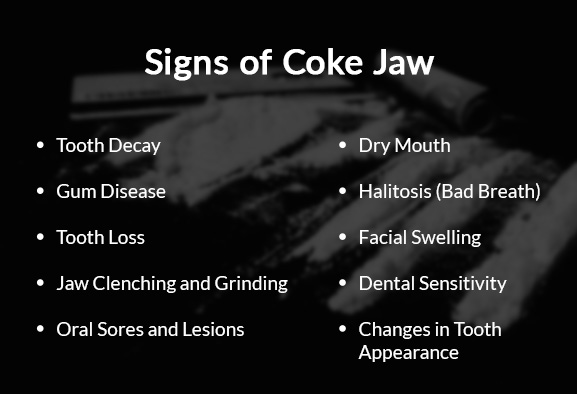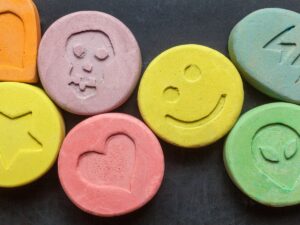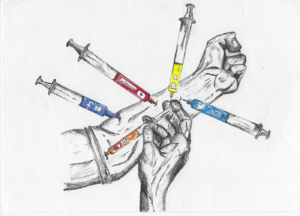In recent years, the term “Coke Jaw” has surfaced, creating a buzz and curiosity among individuals. But what exactly is Coke Jaw?
In this detailed article, we’ll unravel the truth behind this phenomenon, exploring its origins, symptoms, treatments, and much more.
Whether you’ve encountered this term casually or are genuinely seeking knowledge, this guide aims to provide you with comprehensive insights into Coke Jaw.
What is Coke Jaw?
Coke Jaw, also known as meth mouth or methamphetamine-induced dental issues, refers to the severe dental problems resulting from the abuse of substances like cocaine or methamphetamine.
The term “Coke Jaw” originated from the noticeable effects these substances have on the jaw and oral health of individuals who abuse them. It’s crucial to understand that prolonged use of these drugs can lead to devastating consequences, not only for dental health but also for overall well-being.
(Check out our latest blog on Cocaine Addiction Statistics: How Dangerous Is It?)
What Causes Coke Jaw?
“Coke jaw” is primarily caused by the stimulating effects of cocaine on the nervous system. Cocaine, a potent stimulant, has several impacts on the body, particularly on the neuromuscular system, which can lead to the symptoms associated with coke jaw.
Here are the key factors contributing to this condition:
-
Neurological Stimulation:
Cocaine increases levels of dopamine, a neurotransmitter associated with pleasure and movement, among other functions. This surge in dopamine can lead to heightened activity in the neural pathways that control muscle movement, including those in the jaw.
-
Sympathetic Nervous System Activation:
Cocaine triggers the fight-or-flight response, which is part of the sympathetic nervous system. This response can lead to various physical effects, including increased muscle tension and activity, as the body prepares for rapid action.
-
Muscle Hyperactivity:
The stimulant effects of cocaine can cause various muscles, including those controlling the jaw, to become overactive and tense. This can lead to repetitive movements like clenching and grinding.
-
Psychological Factors:
Anxiety, stress, or heightened emotions, which can be effects of cocaine use, might also contribute to jaw clenching and grinding. Users may subconsciously channel their nervous energy or agitation into physical actions, including those affecting the jaw.
-
Magnesium Depletion:
Cocaine use can lead to a depletion of magnesium in the body, a mineral that plays a crucial role in muscle relaxation. Low magnesium levels can exacerbate muscle tension and contribute to symptoms like jaw clenching.
(Check out our latest blog on Stages Of Cocaine Addiction)
What are Some Signs of Coke Jaw?

Coke Jaw, also known as meth mouth or methamphetamine-induced dental issues, manifests through various signs that indicate deteriorating oral health due to substance abuse.
Here are some common signs to watch out for:
Tooth Decay:
One of the primary indicators of Coke Jaw is severe tooth decay. Individuals may notice darkened or discolored teeth, visible holes or pits on the tooth surface, and increased sensitivity to hot or cold temperatures.
Gum Disease:
Gum disease, characterized by inflammation, bleeding gums, and bad breath, often accompanies Coke Jaw. The gums may appear swollen, red, or receded, leading to discomfort and potential tooth loss if left untreated.
Tooth Loss:
As Coke Jaw progresses, tooth loss becomes a significant concern. Teeth may loosen and eventually fall out due to weakened enamel, gum disease, or dental infections caused by substance abuse.
Jaw Clenching and Grinding:
Individuals with Coke Jaw frequently experience jaw clenching and grinding, known as bruxism. This involuntary behavior puts excessive pressure on the teeth and jaw joints, leading to further dental damage and facial pain.
Oral Sores and Lesions:
Substance abuse can compromise the immune system, making individuals more susceptible to oral sores and lesions. These painful ulcers or blisters may develop on the tongue, inner cheeks, or palate, exacerbating discomfort and hindering oral function.
Dry Mouth:
Dry mouth, or xerostomia, is a common side effect of stimulant drugs like cocaine and methamphetamine. Reduced saliva production contributes to oral health issues such as tooth decay, gum disease, and oral infections, exacerbating the effects of Coke Jaw.
Halitosis (Bad Breath):
Persistent bad breath, or halitosis, is another telltale sign of Coke Jaw. It stems from bacterial overgrowth in the mouth, resulting from poor oral hygiene practices and dental decay associated with substance abuse.
Facial Swelling:
In advanced cases of Coke Jaw, facial swelling may occur due to severe dental infections or abscesses. Swelling may affect the cheeks, jawline, or surrounding areas, causing pain, discomfort, and difficulty with everyday activities like chewing and speaking.
Dental Sensitivity:
Increased dental sensitivity to temperature changes, pressure, or sweet foods and drinks is common among individuals with Coke Jaw. Enamel erosion and exposed tooth roots contribute to heightened sensitivity, making eating and drinking uncomfortable.
Changes in Tooth Appearance:
Notable changes in tooth appearance, such as shortened or worn-down teeth, may indicate bruxism associated with Coke Jaw. Additionally, teeth may develop a translucent or glassy appearance due to enamel erosion caused by substance abuse.
Cocaine Addiction Treatment at The All American Detox Center
At All American Detox, we understand the challenges individuals face when dealing with cocaine addiction. Our comprehensive treatment program is designed to provide personalized care and support to help individuals overcome addiction and reclaim their lives.
Here’s an overview of our cocaine addiction treatment approach:
Assessment and Evaluation:
Upon admission, each client undergoes a thorough assessment and evaluation to determine the extent of their addiction and any co-occurring mental health issues. This helps us tailor a treatment plan that addresses the individual’s specific needs and challenges.
Medical Detoxification:
For individuals with severe cocaine addiction, medical detoxification may be necessary to manage withdrawal symptoms and cravings safely. Our medical team closely monitors clients throughout the detox process, ensuring their safety and comfort.
Individualized Therapy:
We offer a variety of evidence-based therapies, including cognitive-behavioral therapy (CBT), dialectical behavior therapy (DBT), and motivational interviewing (MI). These therapies help clients explore the underlying causes of their addiction, develop coping skills, and learn healthier ways of managing stress and emotions.
Group Counseling:
Group counseling sessions provide clients with a supportive environment to share their experiences, gain insights from others, and build a sense of community. Led by experienced therapists, these sessions cover topics such as relapse prevention, communication skills, and addiction education.
Dual Diagnosis Treatment:
Many individuals struggling with cocaine addiction also have co-occurring mental health disorders such as depression, anxiety, or PTSD. Our dual-diagnosis treatment approach addresses both addiction and mental health issues simultaneously, promoting long-term recovery and stability.
Holistic Therapies:
In addition to traditional therapies, we offer holistic approaches such as yoga, meditation, acupuncture, and art therapy. These complementary therapies promote overall well-being, reduce stress, and enhance the mind-body connection.
Aftercare Planning:
Recovery is a lifelong journey, and we provide comprehensive aftercare planning to support clients as they transition back to their daily lives. This may include referrals to outpatient therapy, support groups, sober living housing, and other community resources.
Conclusion
At All American Detox, we are committed to helping individuals break free from the grip of cocaine addiction and build fulfilling, drug-free lives. Our integrated approach combines evidence-based treatments, compassionate care, and ongoing support to promote lasting recovery and wellness.
If you or a loved one is struggling with cocaine addiction, don’t wait any longer to seek help. Contact All American Detox today to learn more about our treatment options and take the first step toward a brighter future





